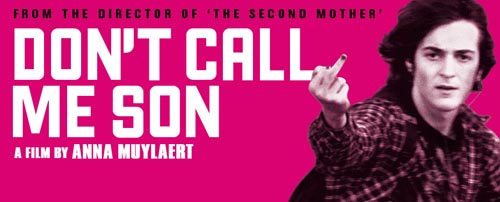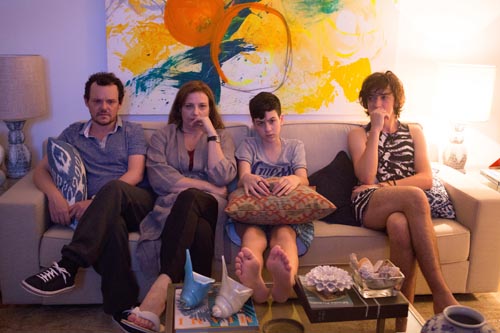
By Roger Costa
The eyes of a girl freeze in time, losing perception, becoming silent in frustration, as if someone is about to collapse in disbelief, tries to hold on to something to escape the painful factual of separation. She’s consoled by a few words of encouragement and warmth, while the camera cuts rapidly to a practice taking place inside a classroom, where children tenderly exercise the comfort of holding and hugging themselves. This disturbingly heartbreaking sequence is the soul of “Don’t Call Me Son” a film that examines the reactions of children caught up with unbearable life-changing circumstances. Before everything else, one must consider a load of aspects to understand this generation’s behavior and living style, their influences and risks, as well as the offers and opportunities they find on this confusing contemporary world, and provoking the essential question: how are we embracing them?

Following up her widely acclaimed Sundance-hit “The Second Mother”, director Anna Muylaert returns with another poignant, insightful and profound study on family issues. As a matter of fact, in her previous work, Muylaert focused on the mother figure, analyzing its topic through a social clash point of view; here, the examination transits completely to the children, now investigating their need of expressing themselves and their ideas, as well as their natural need for acceptance. The center of the story is Pierre, a rebellious and ambiguous student who cultivates a secret fetish of dressing as a girl, is part of a rock band, and engages himself in romantic experiences with both boys and girls. One night he arrives home late just to find his little sister worrying where mother is. A sense of loss and abandon takes control of the room, and eventually mother arrives fearfully guided by police agents.

Pierre learns he was stolen at birth, and so did his sister. Pierre sees his life, and his mother, abruptly being taking away, elevating his doubts and anxieties regarding his identity and his future. The focus of the narrative becomes the attempts of reconciliation and adaptation between the young boy and his biological family, who will do anything to have him at their wings. But Pierre isn’t the only individual the film eagerly explores; Muylaert goes beyond making a statement on the need of compassion among the current generation. Guided by Pierre’s experiences and how he reacts, mostly to the transition of family, Muylaert finds space to stir up other topics reflected on the young ones, such as loneliness, dysfunctional emotions and insecurity demonstrated vividly through the other children, Jaqueline (Pierre’s sister) and his biological brother Joca (who is constantly on the phone, obviously a representation of such a techno-controlled era).

Since the tumultuous introduction, with their mother being taken away, there’s a sense of uncertainty and frustration prevailing throughout the narrative, as the children’s symptoms to the situation is directly transmitted to the audience. This narrative aesthetic develops a mysteriously anxiety, a thrilling experience of shocks and anguish. Of course, none of these attributes would be possible without the courageous, remarkably aggressive performance by Naomi Nero who plays Pierre. The other two children involved, are also tremendously convincing and naturally moving, Daniel Botelho as Joca, the biological brother, and Lais Dias as Jaqueline, the young girl perplexed with the news of abandon. As the cause of every step progressing in the story, Daniela Nefussi plays two roles, as both mothers, with efficient discretion and total control of the differences between the tragically-charged portraits.

Anna Muylaert deserves all credits for this wonderful, honest, sensitive observation on the young generation, trying to understand them, and moving them forward as she addresses their perspectives and aspirations with the eyes of a mother seeking to console and to shelter. She confirms her originality and the rich development of her career choices, with the urgency of depicting contemporary, social, relational and family values. Here, the audience understands the drastic situation, but the film doesn’t look to solve the crime of baby abduction, instead, it investigates profoundly the reactions caused to those devastated by the facts. The sensibility of the narrative never gets the film overwhelmed, although Pierre is going thru a transforming phase of delusion, fragility, revolt and sexual ambiguity. Muylaert fearlessly discloses Pierre’s emotions, creating a hypnotic and intriguing unique character.
Suspenseful and incredibly perceptive and compassionate, “Don’t Call Me Son” is an alarming and extremely important account on the troubles faced by the young generation in need of acceptance and family support.
DON’T CALL ME SON (A Zeitgeist Films Release. Opens Wednesday, November 2nd at Film Forum, NYC)



















Comments